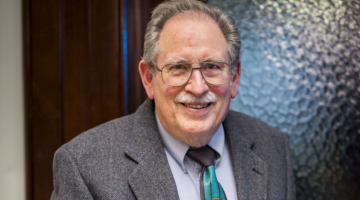
Punam Kaji
“If somebody would’ve told me a year ago / It’ll go get this difficult / Feeling like Katrina with no FEMA / Like Martin with no Gina / Like a flight with no visa.” — Kanye West
Last week, the Asian Pacific Interest Section (APIS) of the State Bar of Texas organized and co-sponsored Hurricane Relief Legal Training with a coalition of diversity bar organizations and community groups at South Texas College of Law Houston.

The Next Chapter In Legal Tech Innovation: Introducing Protégé™
Meet LexisNexis Protégé™, the new AI assistant that leverages personalization choices controlled by the user or their organization to optimize the individual’s AI experience.
Their training focused on ways to help with Hurricane Harvey relief, specifically instructing attorneys and others in the community on how to manage the Federal Emergency Management Agency (FEMA) appeals process. But other issues such as language access and cultural barriers were topics of discussion as well for the 44 attendees.
Yesterday, I had the opportunity to catch up with Punam Kaji, Chair of APIS, associate at Haynes and Boone, LLP, and alumnus of SMU Dedman School of Law. As Harvey’s downpour was still draining, her inbox started flooding with emails from other lawyers. Even attorneys whose homes were damaged were asking, “What should we be doing right now to help?”
As the Chair of APIS, Kaji felt compelled to help focus its attention on a project they could do with several other community organizations. Helping with Harvey relief was very personal for her as well. The week before Harvey hit Houston and the surrounding areas, Kaji had just relocated to Dallas from the ravaged region. This training allowed her to be there in spirit to help after the catastrophe.
Without further ado, here is a (lightly edited and condensed) write-up of our conversation:

A Career In Legal Services: Practising Law Institute Honors Toby J. Rothschild
PLI honors Toby J. Rothschild with its inaugural Victor J. Rubino Award for Excellence in Pro Bono Training, recognizing his dedication and impact.
RC: Your pro-bono initiative focused on training people for the FEMA application appeals process. Why?
PK: The local organizations and pro bono lawyers in Houston did an incredible job getting to the shelters and assisting with FEMA applications. Daniel Hu, an APIS Council Member and board member of Lone Star Legal Aid, informed us that the FEMA Appeals process would come next, and be a difficult stage for those who have been denied FEMA assistance.
We wanted to anticipate the next critical legal need for a Harvey survivor trying to get their life back. We figured if we train lawyers they will be able to take on a pro bono case or even give better advice to friends, family and community members.
RC: What organizations were involved in this pro-bono effort?
PK: Teresa Messer, APIS Secretary and board member of Boat People SOS (BPSOS) Houston, began contacting all the APA organizations that we could bring together. The minority bar associations in Houston created a coalition previously, and Sang Shin, President-Elect of the Asian American Bar Association, thought it wise to use the coalition for this joint effort.
As a result, we had the Hispanic lawyers, African American lawyers, South Asian and Asian lawyers all co-sponsoring the event. In the end, along with APIS, the event was sponsored by the Asian American Bar Association Houston, BPSOS Houston, Houston ECI, Lone Star Legal Aid, OCA Greater Houston, the South Asian Bar Association of Houston, South Texas College of Law Houston, the Hispanic Bar Association Houston, and the Houston Lawyers Association.

Harvey Legal Training Flyer
RC: This was an impactful collaboration between minority bar associations and non-attorney community groups. What do you believe is the benefit to this type of partnership?
PK: Moments like this give us an opportunity to build bridges and become resources for one another, something we hope to continue doing. Houston ECI, which is an umbrella organization for Asian non-profits, gave us valuable information about how we could help.
We got on a call on a Sunday night in September and talked about language and cultural barriers that we needed to tackle, we talked about rural communities outside of Houston, and how we could get in touch with those folks.
We made a list of action items, and on the top of the list was getting some training, so we have the knowledge and skills to do pro bono work.
RC: You mentioned the main priority is to keep these type of pro-bono efforts going and that everyone involved will need the endurance of marathon runners. What other type of activities do you think will be critical in helping hurricane victims get back on their feet?
PK: We could see Harvey-related property disputes, on-going FEMA issues, or insurance claims that could last months or years. Access to affordable or pro bono legal assistance is already a challenge for many Texans. After a natural disaster, our obligation as attorneys to help and serve our community is amplified.
We’ve already discussed doing a follow-up training if needed, keeping lawyers in the know on pro bono events they can attend, or hosting a clinic. APIS has considered how we can do a Harvey-related fundraiser or service effort at our annual Conference in April. We have to stay energized on the issue because for some Harvey survivors this event will impact them for their lifetime.
RC: It was great chatting with you. Is there anything else you would like to share with our audience?
PK: I am apprehensive to pat ourselves on the back when we still have so much work to do. But, on a positive note, I am lucky to be surrounded by attorneys who jump at the opportunity to help.
Even though we have demanding jobs and many time constraints, I see lawyers give themselves to important causes like this one. If I ever find myself tired, I look at what my colleagues are doing and feel re-energized.
I applaud the many organizations that came together for this training and encourage people to get involved in a bar association or community organization that gives back. That spirit of helping is contagious in the best way, and I hope every lawyer gets to experience it.
On behalf of everyone here at Above the Law, I would like to thank Punam Kaji for taking the time to share her story with our audience. We wish her continued success in her career and pro-bono efforts.
Renwei Chung is the Diversity Columnist at Above the Law. You can contact Renwei by email at [email protected], follow him on Twitter (@renweichung), or connect with him on LinkedIn.